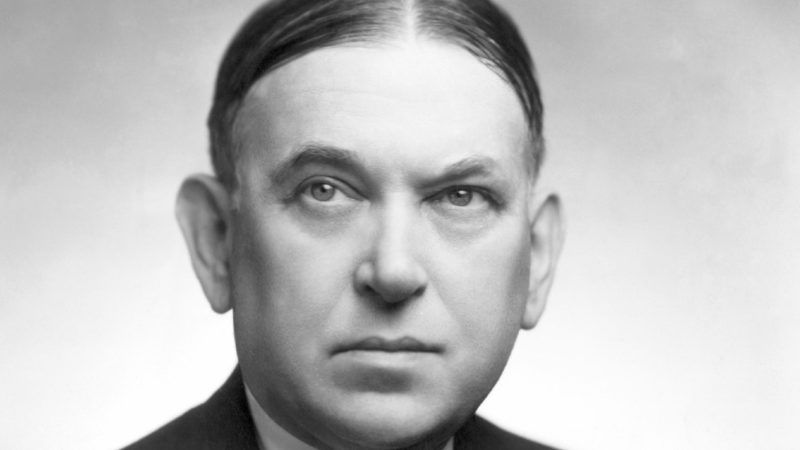H.L. Mencken on 'Numskull' Presidents, the Spanish Flu, and the Depression
Thought during an epidemic from a defender of freedom

Throughout the autumn of 1918, while the infamously acerbic Baltimore journalist H.L. Mencken was completing The American Language, the Spanish flu pandemic took hold of the country. Laws were passed against spitting; streetcar tokens were bathed in antiseptic solution; but nothing could quell the advance of the flu. Few treatments were available. The influenza vaccine did not exist; antibiotics had not yet been invented. Each day columns of obituaries filled the papers. More American civilians died of the virus than American troops died fighting World War I. "All that could be seen from our house were funerals," Mencken's brother recalled. Outside their home on Hollins Street in West Baltimore, the mournful sound of wagons could be heard on nearby Lombard Street, carrying the day's dead to the outlying cemeteries.
Mencken's literary partner, the theater critic George Jean Nathan, had lost his brother to the flu; so had more than 20 of their other friends. It was not uncommon for Mencken to see more than 50 coffins piled in a shed at Union Station in Washington, D.C. He kept working on his book yet felt muggy, suspecting he may be fighting off illness himself, though in his case it was probably hay fever.
Reporters were told to write positive stories to boost public morale. Thanks to President Woodrow Wilson's newly created Committee of Public Information, the press took a strong nationalistic stand in their tone and subject matter, leaning towards the upbeat. Of great support in this task was the Espionage Act, which contained some of the most restrictive sanctions against publications in American history. There were penalties of $10,000 and 20 years in prison for negative coverage. The committee's focus was the war, but flu coverage was affected too.
For Mencken, a champion of the Bill of Rights, such restrictions were outrageous. Most of his focus was spent writing on neutral subjects, but he often was able to insert "a few licks for free speech" and civil rights. A great admirer of the medical establishment, Mencken had written about public health issues years before; he followed the maxim set by the scientist Thomas Henry Huxley, who fought for "the truth as it could be discovered and established—the truth that sets men free." A few editors were too afraid to print his columns.
"We have had so many Presidents who were obvious numskulls that it pleases everyone to contemplate one with an active cortex," Mencken once complained. In the future, "The country will remain safe enough for all practical purposes so long as it is in the hands of a man of character, honest, gallant, and mellowed and moderated by a sense of humor." Character is what we look for in leaders, wrote Mencken: "the assurance that they will act in a certain way in any new situation, and that it will be an honest, resolute and unselfish way."
But Menken lived to see yet another president fail to meet that standard in a crisis. For Mencken, the "Hoover bust" was "one of the most curious phenomena" ever seen in American politics. At first, he observed, President Herbert Hoover had been viewed as "a sort of super-politician," even an "anti-politician," able to handle the country's business "in a more frank and competent manner than the professionals," belonging "to a class of shiny, shallow go-getters who were much esteemed" during the Gilded Age. Then came the Depression, along with Hoover's repeated denials of its existence and then assurances that it would soon go away. Before long, Hoover's assertions began to be seen as "disingenuous, devious and unconvincing….No wonder [the public] distrusts him now. They have sized him up, and got his measure. They know by hard experience he is not to be trusted…they see before them only a shifty and shabby politician, his back to the wall."
The president's apologists "try to make it appear that the right hon. gentleman is suffering unjustly at the hands of the plain people—that he is being blamed for calamities that he is no more responsible for than the policeman on the beat." Presidents usually get the blame when things go badly, just as they get too much of the credit when things go well. But Hoover's inability to be transparent about the economic doom facing the country meant, for Mencken, that he deserved "much more of the damning than any ordinary President would have to face."
"The word principle seems to have no meaning for him," Mencken wrote. "The only thing he appears to think of is his job." What happens to such leaders is inevitable: "Their essential vacuity is plain to all. Facing genuine difficulties they have gone to pieces unanimously." This was true whether a president was conservative or liberal—Mencken was against FDR's New Deal policies. What he wanted was "a competent pilot, able to win and command the crew."
Our current coronavirus quandary is troubling but hardly unprecedented. The country has been there before, and somehow it has always emerged out the other end; our system offers no sure guarantee, but it is what we have. "The science of government is really very simple, else the world would have gone to pot long ago," Mencken once observed. Voters can pin what remains of their trust on leaders who show real character, or they can continue with the rank and file of the sub-par. "Then for the whirlwind!"


Show Comments (39)